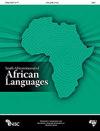基于语料库的鲁利语P索引分析(Bantu,JE103)
IF 0.2
0 LANGUAGE & LINGUISTICS
引用次数: 1
摘要
班图语中的动词通常带有强制性主语(或S/A)前缀,而及物宾语(或P)前缀的存在取决于各种特定的语言因素。一系列主要基于引出数据的研究很好地描述了许多这样的因素。为了研究它们在自然主义文本中的相互作用,我们对班图语鲁利语(JE103)中的宾语前缀(或本文中使用的术语中的P索引)进行了基于语料库的案例研究。超过15000个单词的语料库被注释了动物性、可识别性和文本给定性等变量。使用条件推理树来识别触发P索引的统计相关因素。不出所料,结果表明,Ruuli中P索引的最强预测因子是语序。正如P索引本身一样,我们假设语序是一种表达论点语义和语用特性的差异模式。仅将后者考虑在内,分析表明,首先,P索引似乎是通过语篇给定性强可预测的。其次,如果给定了被指对象,那么如果它是人类,那么它被索引的概率要高得多。本文章由计算机程序翻译,如有差异,请以英文原文为准。
A corpus-based analysis of P indexing in Ruuli (Bantu, JE103)
Verbs in Bantu languages usually carry an obligatory subject (or S/A) prefix, whereas the presence of a transitive object (or P) prefixes depends on various language-specific factors. A number of such factors is well described in a range of studies mainly based on elicited data. To examine their interplay in naturalistic texts, we conducted a corpus-based case study of object prefixes (or P indexing in the terminology used in this article) in the Bantu language Ruuli (JE103). The corpus of over 15 000 words was annotated for variables such as animacy, identifiability and textual givenness. The statistically relevant factors for triggering P indexing were identified using conditional inference trees. Unsurprisingly, the results show that the strongest predictor for P indexing in Ruuli is word order. Just as P indexing itself, we assume that word order is a differential pattern expressing the argument’s semantic and pragmatic properties. Taking only the latter into account, the analyses reveal that firstly, P indexing seems to be strongly predictable by textual givenness. Secondly, if the referent is given, the probability that it gets indexed is significantly higher if it is human.
求助全文
通过发布文献求助,成功后即可免费获取论文全文。
去求助
来源期刊

South African Journal of African Languages
LANGUAGE & LINGUISTICS-
CiteScore
0.50
自引率
0.00%
发文量
30
期刊介绍:
The South African Journal of African Languages is a peer-reviewed research journal devoted to the advancement of African (Bantu) and Khoi-San languages and literatures. Papers, book reviews and polemic contributions of a scientific nature in any of the core areas of linguistics, both theoretical (e.g. syntax, phonology, semantics) and applied (e.g. sociolinguistic topics, language teaching, language policy), and literature, based on original research in the context of the African languages, are welcome. The journal is the official mouthpiece of the African Language Association of Southern Africa (ALASA), established in 1979.
 求助内容:
求助内容: 应助结果提醒方式:
应助结果提醒方式:


